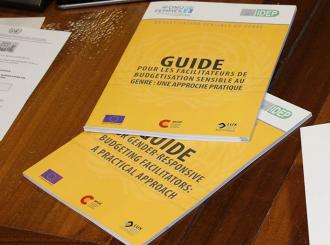
The United Nations African Institute for Economic Development and Planning (IDEP) organised its second Monthly Development Seminar for 2016 on Monday 14th March 2016.
This seminar was devoted to the launch of the Guide on Gender-Responsive Budgeting jointly published by IDEP and UN Women and developed following the Training of Trainers workshop on GRB jointly organized by the two institutions in December 2013. Its purpose is to fill a gap in Gender-Responsive Budgeting capacity by making available a basic tool for training African government officials to mainstream gender in the planning and budgeting processes. To this end, the Guide draws on the Gender-Responsive Budgeting experiences in Senegal and Rwanda.
This publication – which is not just one more guide on GRB – is the outcome of a desire to accompany “all those who are concerned by a better planned and more equitable budget allocation that will enable the achievement of the theme for this year’s International Women’s Day: Planet 50-50 by 2030: Step It Up for Gender Equality” stated the Director of IDEP - Mrs. Karima Bounemra Ben Soltane - at the opening of the seminar. “We have 15 years before us to rise to this challenge” she added.
For his part, Mr. Axel de Ville - Deputy Regional Director of UN Women Office for Western and Central Africa – reminded the audience that the development of the GRB guide was part of two programmes implemented by UN Women, namely: “Financing for Gender Equality” and “Gender Equitable Local Development”. Those two programmes seek to increase the amount of financial resources devoted to gender equality at the national and local levels and they use public policies and the national budget as entry points to achieve the goal of increasing investments directed towards women and girls.
In response to the presentation of the guide, the two discussants, Mr. Socé Sène (Economist and Director of the Gender Institute, Senegal) and Mr. Diarra (Officer in charge of Monitoring and Evaluation at the National Gender Equality Observatory, Senegal) both put the emphasis on the importance of gender-responsive planning processes before the preparation of the budget given that the budget is first and foremost the translation of a policy. They also commended the fact that this guide was practical and its presentation simplified.
The seminar was chaired by Mr. Mamadou Sarr, Principal Private Secretary to His Excellency Mr. Birima Mangara, Minister attached to the Minister of Economy, Finance and Planning, with responsibility for the Budget (Senegal). The event gathered over fifty participants including officials from Senegal’s sectoral ministries, representatives of international organizations, members of the diplomatic corps, researchers, practitioners, the media and many other distinguished guests.